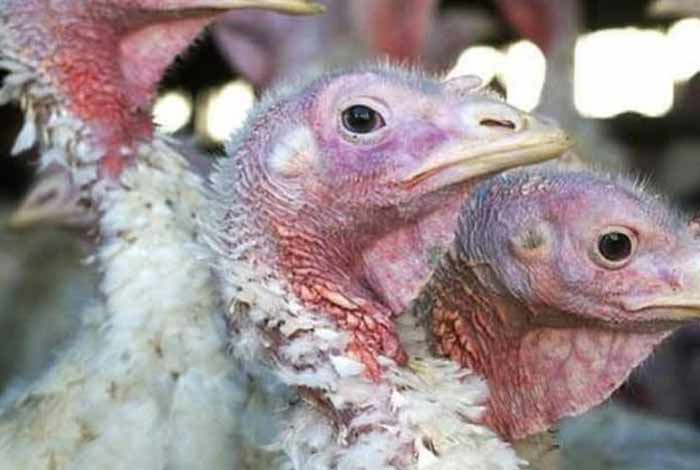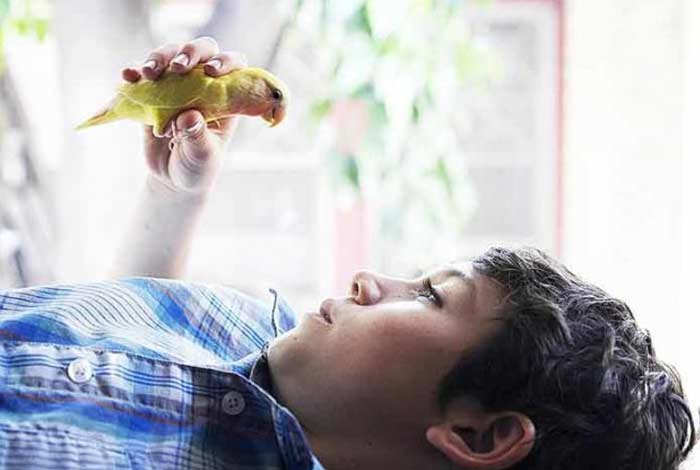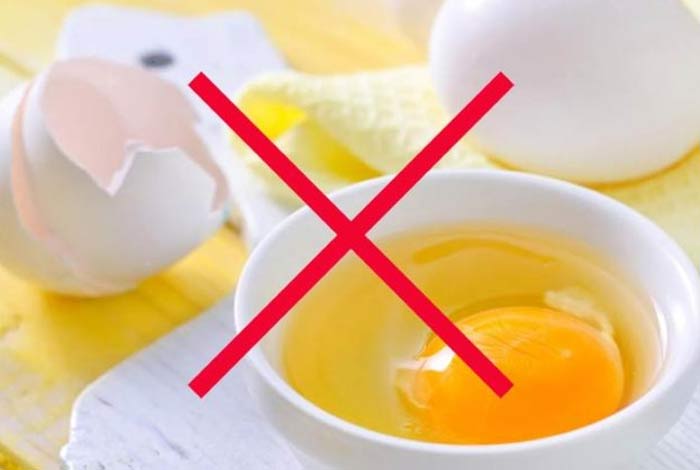H5: It has nine subtypes – H5N1, H5N2, H5N3, H5N4, H5N5, H5N6, H5N7, H5N8 and H5N9. This is known to affect poultry and wild birds. Infections have been reported in over 16 countries. Pneumonia is a consequence of this infection and mortality rate is more than 50%.
H7: It has nine subtypes – H7N1, H7N2, H7N3, H7N4, H7N5, H7N6, H7N7, H7N8 and H7N9. It is rare in humans. But, whoever has been affected by the virus, has faced severe respiratory illness and in some cases, death. Common symptoms of this infection are conjunctivitis and respiratory tract infection.
H9: This virus also has nine subtypes, viz., H9N1, H9N2, H9N3, H9N4, H9N5, H9N6, H9N7, H9N8 and H9N9. It has been found in birds of Asia, Europe and Middle East. Infection from this virus may even lead to death.

Symptoms of Bird Flu:
The H5N1 is the most common type of bird flu. One may have H5N1 infection if typical flu-like symptoms are observed. Following are the symptoms of bird flu:
- Cough
- Difficulty in breathing (respiratory issues)
- High Fever
- Diarrhea
- Muscle pain
- Headache
- Runny nose
- Sore throat
Worsening of symptoms can cause pneumonia, acute respiratory distress syndrome (ARDS), multiple organ failure, septic shock, and even death in some cases.

Risk Factors of Bird Flu
The following groups of people have greater chances of getting affected with bird flu:
- Old people, above the age of 65 years
- Young children, lesser than the age of 5 years
- Women, who are pregnant
- People, who have some medical condition like heart disease, asthma, and lung disease
- People working in poultry farm
- People, who eat raw eggs and undercooked meat
- Family member of someone, who has been affected
- In close contact with the birds
- Working in healthcare teams; those, who are treating infected people.
- Those caring for sick birds, killing sick birds and preparing sick birds for consumption

Do I have Bird Flu?
Bird flu may have symptoms similar to those of regular flu. However, normal flu is a contagious respiratory illness caused by influenza type A and type B viruses. It is seasonal in nature.
On the other hand, Bird Flu is known as avian influenza. It is an infection that spreads from one bird to another. If you are showing various symptoms like coughing, respiratory issues, high fever, body ache, then you may be having bird flu.
Viral pharyngitis is a condition in which a person has cold-like symptoms and sore throat. These symptoms are also similar to those of bird flu. Therefore, it is advised to consult a doctor for correct diagnosis of the condition.

Causes and Prevention of Bird Flu
Causes of Bird Flu:
Humans can become infected after coming in contact with the infected birds. The following are the possible causes:
- Touching infected birds or defeathering them
- Breathing in secretions of infected birds or feces
- Handling sick birds
- Cooking infected poultry
Bird Flu occurs from strains of the influenza virus that enters the avian cells. The virus that leads one up to bird flu is influenza A with eight RNA strands.

Prevention of Bird Flu:
People should pay heed to the following points of caution to prevent bird flu:
- Refrain from touching poultry and birds
- Don’t eat raw eggs. Eat only fully cooked poultry and eggs
- Take care of hygiene. Wash your hands with soap and water before preparing food, after a trip to the washroom. Don’t touch your eyes, mouth or face with your hands
- Stay away from people, who have fever or flu
- Do not visit poultry farms and bird and poultry markets
- See a doctor immediately upon feeling sick or having flu-like symptoms

Diagnosis and Tests for Bird Flu
If there is suspicion of avian flu, diagnostic tests can be used for detecting the virus and identifying the strain. Physical examination, blood tests and chest X-rays are also performed to identify the condition.
In nasopharyngeal culture, a sample of nose and throat secretions is taken using a cotton swab, which is grown in lab and examined under a microscope for detecting avian influenza virus.
Another test known as rapid test is also used to detect bird flu.
Imaging Tests: X-rays may be helpful in understanding the condition of the lungs. This further helps in correct diagnosis and prescribing best treatment option.

Treatment and Care for Bird Flu
Treatment of Bird Flu:
Scientists feel that antiviral medicines like oseltamivir may be an effective line of treatment for bird flu infections in humans. Another drug, known as zanamivir has shown results in lab, but have not yet been used on humans.
Oseltamivir, zanamivir and peramivir are medicines, known as neuraminidase inhibitors. These medicines are available by prescription only and are recommended for the treatment of bird flu in humans by the Center for Disease Prevention and Control (CDC).
A vaccine has been developed and also approved by the FDA for protecting humans from H5N1 bird flu virus. However, it must be noted that H5N1 vaccine does not offer protection against H7N9 bird flu.
Caring for People with Bird Flu:
The following measures can be taken while looking after a person with bird flu:
- Give them a separate room. If possible, give them a separate washroom as well. Also provide them their own washcloth, towel, glass, etc. Make provisions for tissues, alcohol-based sanitizer and facemasks.
- When dealing with sick children, while holding them, place their chin on your shoulder, so that they may not directly cough into your mouth. Wash hands after any proximity with the sick person.
- Encourage the sick person to drink lots of fluids. Offer them fluids like plain water, sports drink, etc. Do not give them alcohol or caffeine-based drinks.
- If the affected person has fever, put a cool washcloth on their forehead. Wash their arms and body with a wet cloth.

OTC Medications and Self-Management Methods for Bird Flu
There is no over-the-counter (OTC) drug available for treating bird flu. Also, it is a viral infection, so medicines is recommended not to be taken without proper consultation of a doctor.
Self-management means taking preventive measures against bird flu to manage the disease by self. One must avoid domesticated birds, and visiting rural areas, flea markets and small farms. Hands should be washed using alcohol-based sanitizers.
If you are traveling, get a flu shot from your doctor. Maybe it won’t protect you from bird flu per say, but it will reduce the risk of infections from bird and human viruses. Also, use hot soapy water for washing utensils that come in contact with poultry. Also cook your chicken thoroughly.

Natural Ways to Cure Bird Flu
The following natural remedies and measures could help manage the symptoms of bird flu:
- Green Tea: It is a rich source of antioxidants. Green tea has compounds that have antiviral properties. It is a natural cure for treating bird flu as it prevents the release of the enzyme, neuraminidase.
- Vitamin C: Bird Flu is a viral infection and viral infections can be prevented by working on the immunity of the body. Vitamin C helps in building immunity. It can be easily obtained from citrus fruits. Eat oranges and lemons on a regular basis. Vitamin C supplements can also be consumed.
- Steam Inhalation: It is good for easing the congestion of the nose. Inhale steam for about 5-10 minutes. Cover your head with a towel while inhaling steam to make it more effective. One can add drops of eucalyptus oil or tea tree oil as they will open up the blocked nasal passage.
- Echinacea: It is a natural cure for bird flu. It is known to purify the blood and strengthen the immunity. One can prepare herbal tea using echinacea and drink it three times a day to get relief from the symptoms of bird flu.
- Astralagus: This herb is used to boost immunity and increase resistance to infections like bird flu. It increases the count of stem cells in bone marrow; thereby, improving the production of white blood cells.
- Turmeric: It contains a compound known as curcumin, which has antimicrobial and anti-inflammatory properties. These properties help in treating fever and fighting against infection.
- Ginger and Garlic: These are used in the natural treatment of bird flu as they have antimicrobial and anti-inflammatory properties.
- Drink Enough Water: Drinking plenty of water will help flush out toxins from the body and will keep nasal membranes hydrated. Children can be given oral rehydration solution (ORS) for making up for the lost fluids.
- Maintain Proper Hygiene: Hygiene plays an important role to prevent bird flu. It will be helpful to wash hands with soaps, particularly under the fingernails. Also, wash hands before eating.
- Adopt Proper Dietary Measures: If one has been diagnosed with bird flu, it will help to take care of one’s diet and eat food that is fresh. For strengthening the immune system, one must eat a lot of salads containing onions, carrots and so on.

Health tip by Expert
One can feed wild birds and ducks, but washing hands thoroughly afterwards is must. Precautions must be taken when one is traveling. Do not consume raw eggs. Cook your eggs properly to avoid the risk of contracting bird flu.















